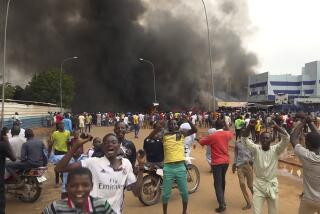Vitality Gleams Through Nigeria’s Bad Image : Africa: The nation has a reputation for corruption and coups. But that view is distorted, ignoring its talent and resiliency.
- Share via
LAGOS, Nigeria — “Going to Nigeria?” asked the security officer at London’s Gatwick Airport. “You must need a frontal lobotomy.”
Many foreigners view Nigeria, sub-Saharan Africa’s richest and most populous nation, as a dangerous place to be avoided.
There is no denying the nation’s record of coups, violence and corruption, but image and reality do not always coincide.
On the surface, Lagos, a humid and decaying coastal city of 7 million people, is a nightmare.
The capital’s traffic jams and a notoriously inefficient telephone system test the resilience of visitors, who are also warned to avoid certain areas at night for their own safety.
But in Nigeria, population 115 million, vitality and talent gleam through the social and economic malaise that affects so much of Africa.
On the noisy, bustling streets of central Lagos, smiling children sell anything--from pins and potatoes to sophisticated electronic equipment--to drivers caught in traffic.
Despite economic hardships in a country where foreign diplomats estimate that 80% of the people live in poverty, music and laughter echo from shanty homes and apartment building in and around Lagos.
At the top end of the scale, wealthy businessmen lounge in chauffeur-driven limousines while traffic police--known as “yellow fever” for the color of their uniforms--try to sort out the unruly traffic.
But only 20% of Nigerians are in salaried jobs, and their average pay is about $145 a month. Senior civil servants can expect at least twice as much.
Nigerians themselves acknowledge the faults in this land of diverse cultures and religious backgrounds.
“It is dirty, callous, noisy, ostentatious, dishonest and vulgar,” author Chinua Achebe wrote in his book “The Trouble with Nigeria.”
“In short,” he added, “it is among the most unpleasant places on Earth.”
Achebe was writing in 1983, just before the last civilian government was toppled in a military coup. The current military government says it will restore civilian rule in 1992.
Nigeria, which won independence from Britain in 1960, has immense oil and natural gas reserves that could keep it afloat economically for at least 50 years.
However, the era of civilian rule saw Nigeria’s oil-based wealth squandered as world prices declined, leading the country from boom to near-bust.
Some Nigerians blame foreigners for the country’s poor image.
“Foreigners come here with the intention of cheating Nigerians. But they come smack into people who are 100 times more capable at it,” said Ashikiwe Adione-Egom, publisher of the Financial Post, a respected weekly.
“Nigeria is one country which expatriates have done their damnedest to bad-mouth abroad,” he said.
Thousands of non-Nigerians live in Lagos, generally in guarded compounds with swimming pools and tennis courts.
“I have been here two years. I heard a lot about the place and knew it could be the pits. But it is good, basically, because of the people,” a senior European banker said.
“There are frustrations and we tend to adopt a siege mentality,” he added.
Many foreign firms, embassies and residential compounds are in the relatively safe Ikoyi and Victoria Island areas, where large houses and tree-lined roads hark back to a colonial past.
Some foreigners venture to nearby Lagos Island, site of the city’s commercial and banking center, only in dire need--and even then only with a driver because of perceived dangers.
Other expatriates admit to a love-hate relationship with Nigeria.
“Nigeria is one of the best-kept secrets,” said a longtime resident who has varied business interests and growing bank balance.
“The quality of life has improved dramatically since the early 1980s, when garbage lined streets, shops were empty and traffic barely moved.”
More to Read
Sign up for Essential California
The most important California stories and recommendations in your inbox every morning.
You may occasionally receive promotional content from the Los Angeles Times.













